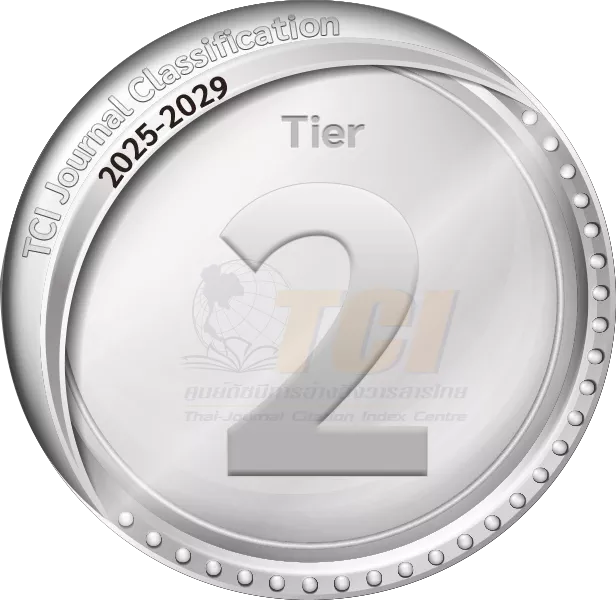Demotivation in Second Language Learning: Evidences from Some English Majors from a Public University in China
DOI:
https://doi.org/10.14456/abacodijournal.2025.17Abstract
Demotivation often plays a significant role in undermining the expected outcome in L2 learning. This study, under the guidance of the Complex Dynamic System Theory, explored L2 demotivation among some Chinese university undergraduate English majors and obtained evidences about the processes and patterns of its dynamic changes across three academic years. A mixed methods methodology involving the triangulation of a questionnaire survey on L2 demotivation, Graphs of L2 Motivational Trajectory Modelling and stimulated recall interviews was employed. A large proportion of the participants of the study were found to be with demotivation in L2 learning despite having received three years of specialized training in English. The trajectory modelling of the evolvement of the motivation and demotivation revealed that each participant has experienced certain degree of demotivation, but with unique trajectory and experiences. The amalgamation of the graphs that modelled the trajectories revealed several patterns within the L2 demotivational dynamism, based on which different types of L2 motivational profiles were also identified
References
Chen, J. F., Warden, C. A., & Chang, H. T. (2005). Motivators that do not motivate: The case of Chinese EFL learners and the influence of culture on motivation. TESOL Quarterly, 39(4), 609-633. https://doi.org/10.2307/3588524
Chong, M. Y., Renandya, W. A., & Ng, Q. R. (2019). Demotivation in L2 Classrooms: Teacher and Learner Factors. Language Education and Acquisition Research Network Journal, 12(2), 64-75.
Creswell, J. W., & Creswell, J. D. (2018). Research Design Qualitative, Quantitative, and Mixed Methods Approaches. Sage.
Dai, J. (2015). The Construction of College English Blended Learning Model under the Graded Teaching Pattern. Journal of Chongqing Institute of Technology (Social Science edition), 11, 8.
Dornyei, Z. (1998). Demotivation in foreign language learning [Paper presented]. the TESOL ’98 Congress, Seattle.
Dornyei, Z., & Ryan, S. (2015). The Psychology of the Language Learner Revisited. Routledge.
Dornyei, Z., & Ushioda, E. (2011). Teaching and Researching Motivation (2nd ed.). Routledge. https://doi.org/10.4324/9781315833750
Ellis, N. C., & Larsen-Freeman, D. (2006). Language emergence: Implications for applied linguistics--introduction to the special issue. Applied Linguistics, 27(4), 558-589. https://doi.org/10.1093/applin/aml028
Gass, S. M., & Mackey, A. (2017). Stimulated recall methodology in applied linguistics and L2 research. Routledge, Taylor & Francis Group.
Gorham, J., & Christophel, D. M. (1992). Students’ Perceptions of Teacher Behaviors as Motivating and Demotivating Factors in College Classes. Communication Quarterly, 40, 239-252. https://doi.org/10.1080/01463379209369839
Greene, J. C. (2007). Mixed methods in social inquiry. Jossey-Bass.
Kikuchi, K. (2009). Listening to our learners’ voices: What demotivates Japanese high school students?. Language Teaching Research, 13(4), 453-471.
https://doi.org/10.1177/1362168809341520
Kikuchi, K. (2015). Demotivation in second language acquisition: Insights from Japan. Multilingual Matters.
Koizumi, R., & Matsuo, K. (1993). A longitudinal study of attitudes and motivation in learning English among Japanese seventh-grade students. Japanese Psychological Research, 35(1), 1-11. https://doi.org/10.4992/psycholres1954.35.1
Larsen-Freeman, D. (1997). Chaos/Complexity Science and Second Language Acquisition. Applied Linguistics, 18(2), 141-165.
https://doi.org/10.1093/applin/18.2.141
Li, L. (2013). A study on internal factors of Chinese college EFL learners' demotivation. Journal of PLA University of Foreign Languages, 36(2), 65-69.
Liu, J. (2011). A study on demotivation among English major university students. Journal of Guangdong Ocean University, 31(5), 95-99.
Papi, M., & Teimouri, Y. (2012). Dynamics of selves and motivation: A cross‐sectional study in the EFL context of Iran. International Journal of Applied Linguistics, 22(3), 287-309. https://doi.org/10.1111/j.1473-4192.2012.00312.x
Plonsky, L. (2015). Advancing Quantitative Methods in Second Language Research (1st ed.). Routledge. https://doi.org/10.4324/9781315870908
Sampson, R. J. (2016). Complexity in classroom foreign language learning motivation: a practitioner perspective from Japan. Multilingual Matters.
Sohu. (2023). English is first, computer science is second! The ranking of the number of majors offered by Chinese universities in 2023 has been released."
https://www.sohu.com/a/717697310_121124007
Song, B., & Kim, T.-Y. (2017). The dynamics of demotivation and remotivation among Korean High School EFL Students. System, 65, 90-103.
https://doi.org/10.1016/j.system.2016.12.010
Tachibana, Y., Matsukawa, R., & Zhong, Q. X. (1996). Attitudes and motivation for learning English: A cross-national comparison of Japanese and Chinese high school students. Psychological Reports, 79(2), 691-700.
https://doi.org/10.2466/pr0.1996.79.2.691
Taguchi, T., Magid, M., & Papi, M. (2009). 4. the L2 motivational self system among Japanese, Chinese and Iranian learners of English: A comparative study. In Z. Dornyei & E. Ushioda (Eds.), Motivation, Language Identity and the L2 Self (pp. 66-97). Multilingual Matters. https://doi.org/10.21832/9781847691293-005
Tanaka, M. (2017). Examining EFL vocabulary learning motivation in a demotivating learning environment. System, 65, 130-138. https://doi.org/10.1016/j.system.2017.01.010
Thorner, A., & Kikuchi, A. (2019). Lamb, M., Csizér, K., Henry, A., & Ryan, S. (2021). The Palgrave Handbook of Motivation For Language Learning. Palgrave Macmillan.
Trang, T. T., & Baldauf, R. B. (2007). Demotivation: Understanding Resistance to English Language Learning - The Case of Vietnamese Students. The Journal of Asia TEFL, 4, 79-105. https://core.ac.uk/download/pdf/14986245.pdf
Ushioda, E. (2013). Foreign language motivation research in Japan: An “insider” perspective from outside Japan. In M. Apple, D. Silva, & T. Fellner (Eds.), Language Learning Motivation in Japan (pp.1-14). Multilingual Matters.
WeCom. (2024). Connection Makes a Smarter Business. https://work.weixin.qq.com/
Zhang, C. (2007). Fundamentals of Environmental Sampling and Analysis. John Wiley and Sons.
Zhou, C. B., & Wang, W. B. (2012). Investigation and research on influencing factors of negative motivation among college English learners. Foreign Languages in China, (9), 48-55.
Zhou, W., Zhan, Y., & Jawing, E. (2023). Analyzing EFL learners’ demotivating factors in blended learning context. Frontiers in Psychology, 14, 1-9.



